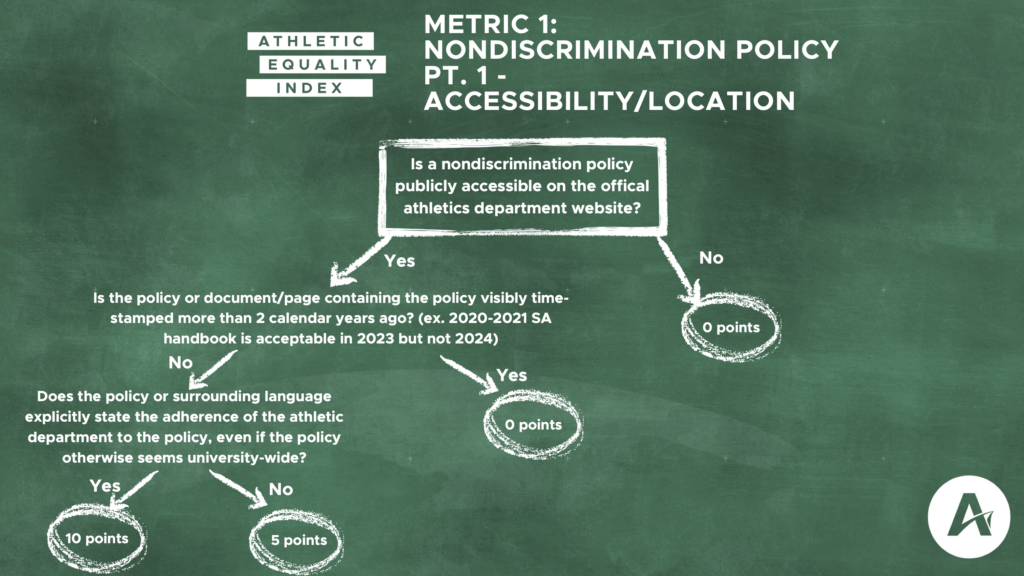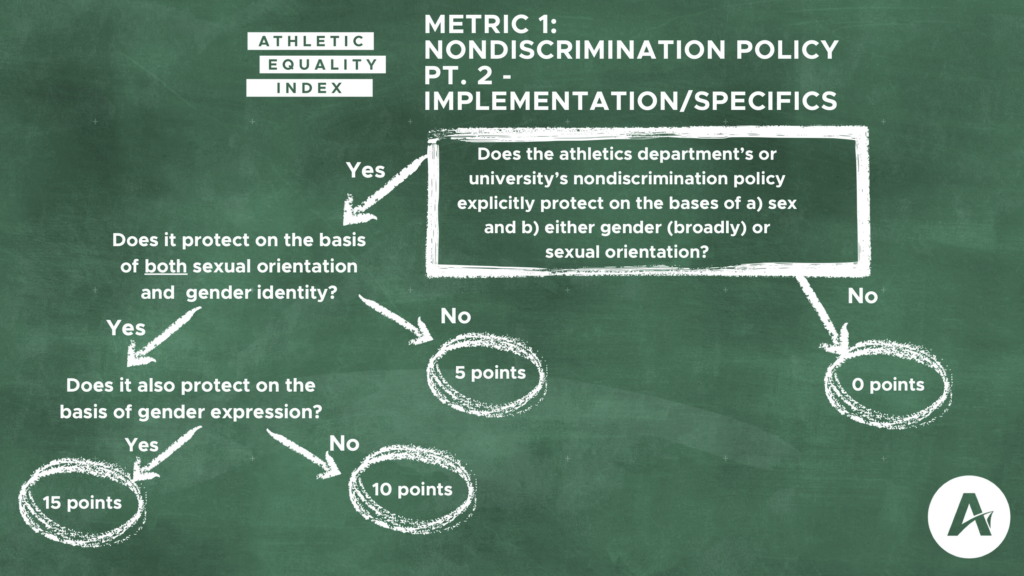Has the athletic department expressly adopted and publicly endorsed a nondiscrimination policy to protect persons no matter their sexual orientation, gender identity, and gender expression, which also offers an accessible reporting mechanism or the contact information for a point person?
Methodology update as of July 2023: If AEI evidence (or the document or page containing the evidence) has a visible time-stamp, date range of application, or departmental review date, such time-stamps must be dated within the last 2 calendar years to qualify for scoring purposes. Evidence that is explicitly timestamped more than 2 calendar years before an institution’s annual audit cannot be reasonably assumed to remain unchanged in its application to current students unless explicitly stated by the athletic department. We use calendar years to make these distinctions; for example, a 2020-2021 student-athlete handbook is acceptable evidence for an audit conducted in 2023, but would not be acceptable for an audit conducted in 2024.
- Institutions with nondiscrimination policies that explicitly protect the LGBTQ+ community have reduced levels of heterosexism.
- Institutions with nondiscrimination policies that explicitly protect the LGBTQ+ community have fewer LGBTQ+ interpersonal and environmental microaggressions.
- Institutions with nondiscrimination policies that explicitly protect the LGBTQ+ community have LGBTQ+ students with lower perceived anxiety/stress and higher self-esteem.
- Institutions with nondiscrimination policies that explicitly protect the LGBTQ+ community have stronger LGBTQ+ pride on campuses.


Nondiscrimination policies protect against discrimination based on race, color, religion, sex (including pregnancy, sexual orientation, or gender identity), national origin, disability, age, or genetic information (including family medical history) (U.S. Equal Employment Opportunity Commission). Research suggests nondiscrimination policies that explicitly protect the LGBTQ+ community foster climates that reduce bias and decrease microaggressions against LGBTQ+ students (Garvey et al., 2017, Woodford et al., 2016). LGBTQ+ students perceived decreased anxiety and stress, as well as increased self-esteem and pride on campuses that implement such policies (Woodford et al., 2018). These policies may also exert protective effects on the mental health of the LGBTQ+ community (Hatzenbuehler & Keyes, 2013). However, simply having these policies may not accurately reflect an institution’s inclusiveness (Hatzenbuehler & Keyes, 2013), highlighting the importance of continual evaluation of the effectiveness and enactment of such policies.
U.S. Equal Employment Opportunity Commission. (n.d.). General nondiscrimination policy tips. Publicly available here.
Garvey, J. C., Sanders, L. A., & Flint, M. A. (2017). Generational perceptions of campus climate among LGBTQ undergraduates. Journal of College Student Development, 58(6), 795-817. Publicly available here.
Woodford, M. R., Joslin, J., & Renn, K. (2016). LGBTQ students on campus: Fostering inclusion through research, policy and practice. In P. Pasque, M. Ting, N. Ortega, & J. Burkhardt (Eds.), Transforming understandings of diversity in higher education: Demography, democracy and discourse (pp. 57-80). Sterling, VA: Stylus Publishing.
Woodford, M. R., Kulick, A., Garvey, J. C., Sinco, B. R., & Hong, J. S. (2018). LGBTQ policies and resources on campus and the experiences and psychological well-being of sexual minority college students: Advancing research on structural inclusion. Psychology of Sexual Orientation and Gender Diversity, 5(4), 445-456. Publicly available here.